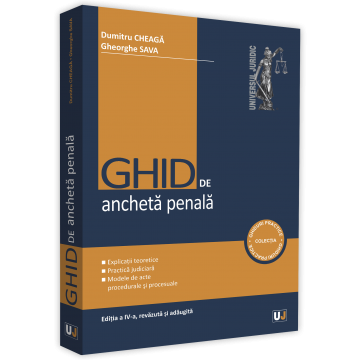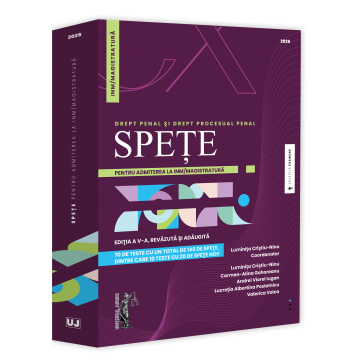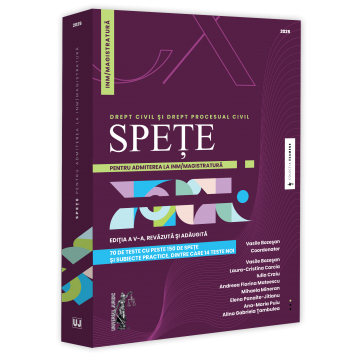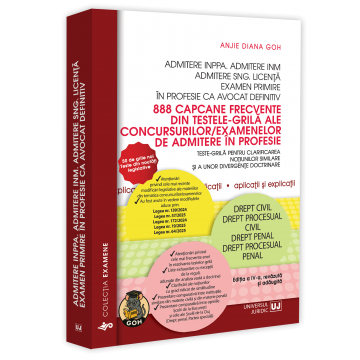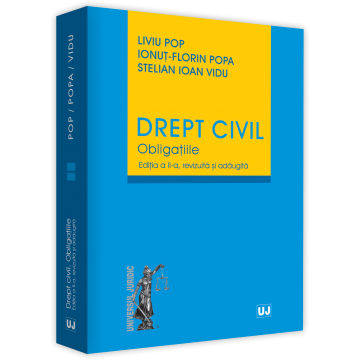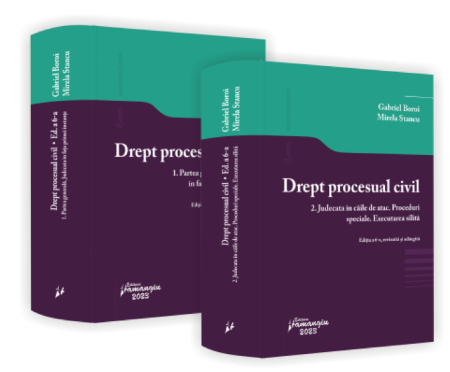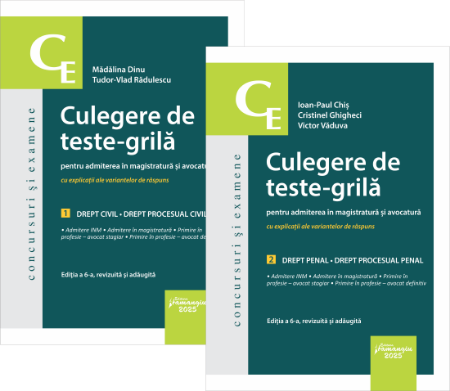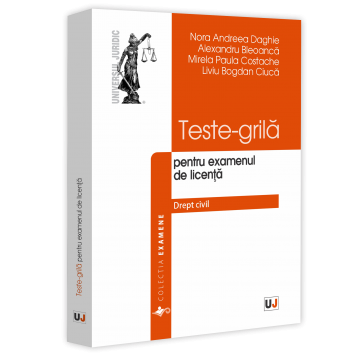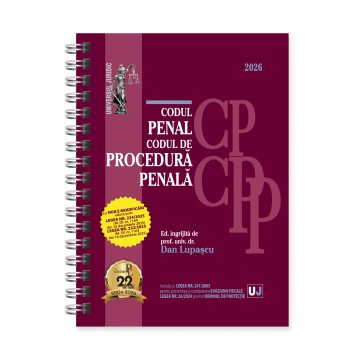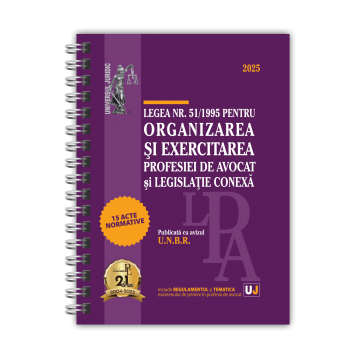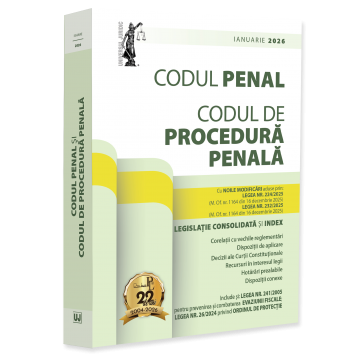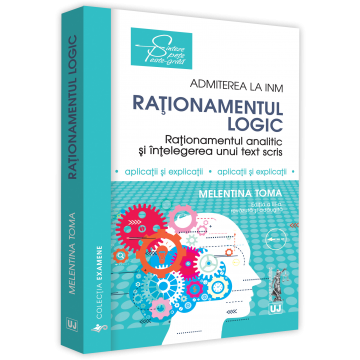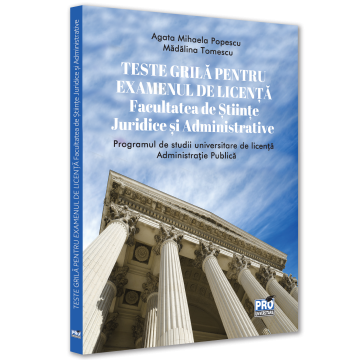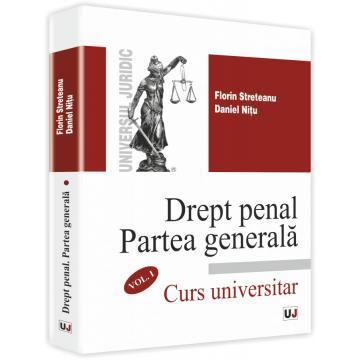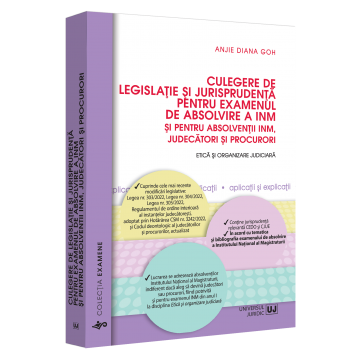Manuscript proposals: [email protected] / 0745 204 115 //// Tracking orders Individuals / Sales: 0745 200 357 / Orders Legal entities: 0721 722 783
ISBN: 978-606-28-0297-4
DOI: 10.5682/9786062802974
Publisher year: 2015
Pages: 278
Publisher: Editura Universitară
Author: Ramona Duminica
Product Code:
9786062802974
Do you need help?
0745 200 357
- Description
- Download (1)
- Authors
- Content
- More details
- Reviews (0)
Our preoccupations for studying the legislation activity are older, the doctoral thesis, “Law and legislation in the current Romanian society”, constituting the starting point. Then followed several specialized articles in which we discussed topics such as: the influence of the international environment on the act of legislation, the role of legal conceptualism in the technical construction of law, European constraint of domestic law, legislative inflation, unintelligibility of laws, etc. However, the research focused only on the period 1991-2007, which is why through this paper we aim to continue the analysis of the internal legislative process after integration into the European Union, but also to extend the analysis to the EU legislative activity.
Product compliance information
-
The law-making after EU integration. Analysis of technique and legislative procedure
Download
Ramona Duminica
Content
ARGUMENT / 8
CHAPTER I
CURRENT ROMANIAN PARLIAMENTARISM / 12
Section 1. Place, role and functions of the Parliament within the state / 12
Section 2. The role of the Government in the exercise of the legislative function. Are we witnessing a decline of parliamentarism in contemporary Romania? / 22
CHAPTER II
LAW, / LEGISLATIVE PROCESS, LEGISLATIVE AND LEGISTIC TECHNIQUE. CONCEPTUAL BOUNDARIES / 45
Section 1. Definition of the law / 45
Section 2. Types of laws / 71
Section 3. Delimitation of the concepts of legislation, legal technique, legislative and legal technique / 98
CHAPTER III
SETTING THE OBJECTIVES IN THE LEGISLATION ACTIVITY / 108
Section 1. Legal policy, / 108
Legislative policy and the legislative program / 108
Section 2. Public policies and legislative activity / 118
CHAPTER IV
MECHANISM / DETERMINATION OF FUTURE REGULATORY SOLUTIONS / 125
Section 1. Scientific knowledge of reality - an essential condition for efficient legislation / 125
Section 2. Means and methods of documentation used in the activity of elaborating the law / 129
Section 3. Transposition of the basis of the legislative decision in the motivation of the draft law / 137
CHAPTER V
WRITING THE LAW. / 145
THE ROLE OF LEGAL CONCEPTUALISM AND LANGUAGE / 145
Section 1. Legal conceptualism in the technical construction of the law / 145
Section 2. Language and style in drafting the law / 155
CHAPTER VI
CHOOSING THE FORM OF EXPRESSION / 161
OF THE WILL OF THE LEGISLATOR / 161
Section 1. Identifying the way of regulation and establishing the form of expression of the legal norm / 161
Section 2. Architecture of the law / 167
CHAPTER VII
NATIONAL LEGISLATIVE PROCEDURES / 174
Section 1. Ordinary legislative procedure / 174
Section / 2. Special and complementary legislative procedures / 217
CHAPTER VIII
THE LEGISLATIVE PROCESS IN THE EUROPEAN UNION / 234
Section 1. The legislative process in some Member States of the European Union / 234
Section 2. Procedure for the adoption of Union legislative acts / 248
BIBLIOGRAPHY / 265
ARGUMENT / 8
CHAPTER I
CURRENT ROMANIAN PARLIAMENTARISM / 12
Section 1. Place, role and functions of the Parliament within the state / 12
Section 2. The role of the Government in the exercise of the legislative function. Are we witnessing a decline of parliamentarism in contemporary Romania? / 22
CHAPTER II
LAW, / LEGISLATIVE PROCESS, LEGISLATIVE AND LEGISTIC TECHNIQUE. CONCEPTUAL BOUNDARIES / 45
Section 1. Definition of the law / 45
Section 2. Types of laws / 71
Section 3. Delimitation of the concepts of legislation, legal technique, legislative and legal technique / 98
CHAPTER III
SETTING THE OBJECTIVES IN THE LEGISLATION ACTIVITY / 108
Section 1. Legal policy, / 108
Legislative policy and the legislative program / 108
Section 2. Public policies and legislative activity / 118
CHAPTER IV
MECHANISM / DETERMINATION OF FUTURE REGULATORY SOLUTIONS / 125
Section 1. Scientific knowledge of reality - an essential condition for efficient legislation / 125
Section 2. Means and methods of documentation used in the activity of elaborating the law / 129
Section 3. Transposition of the basis of the legislative decision in the motivation of the draft law / 137
CHAPTER V
WRITING THE LAW. / 145
THE ROLE OF LEGAL CONCEPTUALISM AND LANGUAGE / 145
Section 1. Legal conceptualism in the technical construction of the law / 145
Section 2. Language and style in drafting the law / 155
CHAPTER VI
CHOOSING THE FORM OF EXPRESSION / 161
OF THE WILL OF THE LEGISLATOR / 161
Section 1. Identifying the way of regulation and establishing the form of expression of the legal norm / 161
Section 2. Architecture of the law / 167
CHAPTER VII
NATIONAL LEGISLATIVE PROCEDURES / 174
Section 1. Ordinary legislative procedure / 174
Section / 2. Special and complementary legislative procedures / 217
CHAPTER VIII
THE LEGISLATIVE PROCESS IN THE EUROPEAN UNION / 234
Section 1. The legislative process in some Member States of the European Union / 234
Section 2. Procedure for the adoption of Union legislative acts / 248
BIBLIOGRAPHY / 265
Our preoccupations for studying the legislation activity are older, the doctoral thesis, “Law and legislation in the current Romanian society”, constituting the starting point. Then followed several specialized articles in which we discussed topics such as: the influence of the international environment on the act of legislation, the role of legal conceptualism in the technical construction of law, European constraint of domestic law, legislative inflation, unintelligibility of laws, etc. However, the research focused only on the period 1991-2007, which is why through this paper we aim to continue the analysis of the internal legislative process after integration into the European Union, but also to extend the analysis to the EU legislative activity.
The motivation to continue researching this topic was born both from the desire to cover a gap reported in current scientific discourses on legislation, but especially from the finding that the national legislative process in the post-integration period acquires new values and raises particular issues. Traditionally, according to the Constitution, the Parliament is the only legislative authority of the country, and the Government's main function is to organize the execution of laws.
De facto, however, in the context of such a rapid and complex evolution of contemporary society, the situation has changed, appearing in practice, more and more often, imbalances between the prerogatives of the Government and those of the Parliament. The Government is increasingly involved in the exercise of the legislative function, especially through the legislative initiative, the legislative delegation, the participation in the parliamentary debates, the procedure of the vote of confidence regarding a legislative text. Basically, we are witnessing a decline of the institution of the Parliament as the only legislative authority, and in Romania in recent years, this declining trend of parliamentarism is increasingly evident.
Beyond this attempt to “submit” the parliamentary institution by the Government, in the field of elaboration of the national legislation, a series of rules assumed as a result of the integration in the European Union must be observed. The rules of Union law are usually imposed with the utmost harshness at national level, and Parliament is often "dismissed" from its position as legislator, becoming a mere "translator". Aware of the corrosive effect that Union law has on domestic legislation, the European Union has sought to limit this danger by increasing the role of national parliaments, as well as by enshrining the principles of subsidiarity and proportionality, currently strengthened by the Treaty of Lisbon.
Although significant improvements have been made to the Union legislative process through this treaty, the role of national parliaments is still symbolic, the goal of better regulation at EU level. remaining a priority and a permanent challenge.
In this context, this paper focuses on revealing the specificity of Romanian parliamentarism, studying the principles of legislative technique, analyzing national legislative procedures and, last but not least, identifying the peculiarities of the legislative process in the European Union and the involvement of national parliaments.
Compared to the scope of the title, the analysis does not claim to be an exhaustive study, but represents an invitation to reflection, the purpose being mainly to relaunch discussions on this topic from a new perspective and to contribute to the completion of scientific research in the field studied. , thus joining other works aimed at improving the quality of the legislative act at national and union level.
The motivation to continue researching this topic was born both from the desire to cover a gap reported in current scientific discourses on legislation, but especially from the finding that the national legislative process in the post-integration period acquires new values and raises particular issues. Traditionally, according to the Constitution, the Parliament is the only legislative authority of the country, and the Government's main function is to organize the execution of laws.
De facto, however, in the context of such a rapid and complex evolution of contemporary society, the situation has changed, appearing in practice, more and more often, imbalances between the prerogatives of the Government and those of the Parliament. The Government is increasingly involved in the exercise of the legislative function, especially through the legislative initiative, the legislative delegation, the participation in the parliamentary debates, the procedure of the vote of confidence regarding a legislative text. Basically, we are witnessing a decline of the institution of the Parliament as the only legislative authority, and in Romania in recent years, this declining trend of parliamentarism is increasingly evident.
Beyond this attempt to “submit” the parliamentary institution by the Government, in the field of elaboration of the national legislation, a series of rules assumed as a result of the integration in the European Union must be observed. The rules of Union law are usually imposed with the utmost harshness at national level, and Parliament is often "dismissed" from its position as legislator, becoming a mere "translator". Aware of the corrosive effect that Union law has on domestic legislation, the European Union has sought to limit this danger by increasing the role of national parliaments, as well as by enshrining the principles of subsidiarity and proportionality, currently strengthened by the Treaty of Lisbon.
Although significant improvements have been made to the Union legislative process through this treaty, the role of national parliaments is still symbolic, the goal of better regulation at EU level. remaining a priority and a permanent challenge.
In this context, this paper focuses on revealing the specificity of Romanian parliamentarism, studying the principles of legislative technique, analyzing national legislative procedures and, last but not least, identifying the peculiarities of the legislative process in the European Union and the involvement of national parliaments.
Compared to the scope of the title, the analysis does not claim to be an exhaustive study, but represents an invitation to reflection, the purpose being mainly to relaunch discussions on this topic from a new perspective and to contribute to the completion of scientific research in the field studied. , thus joining other works aimed at improving the quality of the legislative act at national and union level.
If you want to express your opinion about this product you can add a review.
write a review

6359.png)
![The law-making after EU integration. Analysis of technique and legislative procedure [1] The law-making after EU integration. Analysis of technique and legislative procedure [1]](https://gomagcdn.ro/domains/editurauniversitara.ro/files/product/large/activitatea-de-legiferare-dupa-integrarea-in-uniunea-europeana-analiza-a-tehnicii-si-procedurii-legislative-728-375712.jpg)
